Let’s be honest: the line between history and fiction doesn’t really exist. After all, history is just stories we tell ourselves. The way we tell those stories says more about our time than about the times we’re examining. Reading about decades- or even centuries-old events in contemporary sources and then comparing how we talk—or don’t talk—about them now is a sobering insight into how writing history shifts what happened into what we think happened and how we process it long after the fact.
So when we write fantasy using history as our playground, we aren’t really rewriting history. We’re writing our own questions played out on a historical background. Fortunately for us, history is cyclical, and we keep needing the same questions answered again and again and again.
The very best books use those legends and histories so seamlessly that, after reading, you feel like you know true things. And even if much of the history you are then driven to research turns out to be made up, that sense of truth captured by the writer doesn’t fade.
With that in mind, here are my five favorite books that use European history or historical legends as a background for asking timeless questions about life, love, and the reality of magic.
The Once and Future King by T. H. White
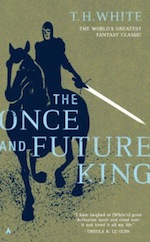 As the basis for this brilliant novel, White uses the legends of King Arthur and Camelot. What could have been merely a retelling becomes something so much larger as he uses those tales to explore kingdoms, wars, politics, love, loyalty, and the transient, unobtainable notion of goodness. As we follow Arthur from child to man to king, we grow with him and carry the weight of all that knowledge and all those choices, too. Though not the original, White’s Camelot (not a silly place at all) feels far truer than any other version.
As the basis for this brilliant novel, White uses the legends of King Arthur and Camelot. What could have been merely a retelling becomes something so much larger as he uses those tales to explore kingdoms, wars, politics, love, loyalty, and the transient, unobtainable notion of goodness. As we follow Arthur from child to man to king, we grow with him and carry the weight of all that knowledge and all those choices, too. Though not the original, White’s Camelot (not a silly place at all) feels far truer than any other version.
The Raven Cycle by Maggie Stiefvater
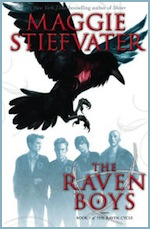 There was once a Welsh prince named Owain Glyndŵr. That much is true. Maggie Stiefvater is one of the greatest current YA writers. That much is also true. The rest—five friends, practical psychics, ley lines, dreams and nightmares coming to life, true love that is literally deadly, wealthy connoisseurs of wonder, and really awful cars described in loving detail—uses the myth of Glyndŵr waiting to be called back to tell a fantastic-but-true-feeling story of what it is to long for magic in a world that constantly tries to deny you. Stiefvater’s books will give you a little bit of that magic back.
There was once a Welsh prince named Owain Glyndŵr. That much is true. Maggie Stiefvater is one of the greatest current YA writers. That much is also true. The rest—five friends, practical psychics, ley lines, dreams and nightmares coming to life, true love that is literally deadly, wealthy connoisseurs of wonder, and really awful cars described in loving detail—uses the myth of Glyndŵr waiting to be called back to tell a fantastic-but-true-feeling story of what it is to long for magic in a world that constantly tries to deny you. Stiefvater’s books will give you a little bit of that magic back.
His Fair Assassin series by Robin LaFevers
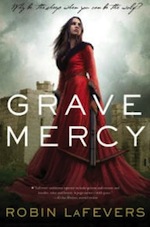 I’ll say it up-front: There wasn’t a secret island convent of assassin nuns (the bastard children of the God of Death) that got swept up in political intrigue in Medieval Brittany. More’s the pity, because assassin nuns. But LaFevers works her subtle fantasy elements so seamlessly into the tapestry of a real-life historical border war you can’t quite give up the hope that maybe—just maybe—LaFevers knows some things we don’t.
I’ll say it up-front: There wasn’t a secret island convent of assassin nuns (the bastard children of the God of Death) that got swept up in political intrigue in Medieval Brittany. More’s the pity, because assassin nuns. But LaFevers works her subtle fantasy elements so seamlessly into the tapestry of a real-life historical border war you can’t quite give up the hope that maybe—just maybe—LaFevers knows some things we don’t.
Jonathan Strange & Mr. Norrell by Susanna Clarke
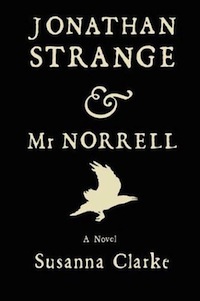 This massive tome is as charming as it is wordy. It’s hard to believe it wasn’t written during the Napoleonic Wars; Clarke’s imitation of the style of the time is a master class in voice. Her footnotes, referencing legends and histories that didn’t actually occur, are one of the highlights of a highlight-packed book. But her reimagining of an England that had actual magic in its past—and future—feels so plausible because of how much is rooted in the actual regional myths and legends of the British Isles. Stories have it that, back in the day, if you suspected your house was on a fairy path, you moved. That same sense of wonder and dread at the mysteries of magic permeates this one-of-a-kind, deeply British book.
This massive tome is as charming as it is wordy. It’s hard to believe it wasn’t written during the Napoleonic Wars; Clarke’s imitation of the style of the time is a master class in voice. Her footnotes, referencing legends and histories that didn’t actually occur, are one of the highlights of a highlight-packed book. But her reimagining of an England that had actual magic in its past—and future—feels so plausible because of how much is rooted in the actual regional myths and legends of the British Isles. Stories have it that, back in the day, if you suspected your house was on a fairy path, you moved. That same sense of wonder and dread at the mysteries of magic permeates this one-of-a-kind, deeply British book.
Outlander by Diana Gabaldon
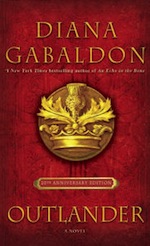 Come for the time travel, stay for the kilts. Gabaldon’s book is famously hard to categorize—is it fantasy? Sci-fi? Historical romance with a slightly magical twist? In the end, it doesn’t matter what it is, because what it isn’t is boring. Ever. Taking a plucky World War II nurse and throwing her back in time to Scotland during the Jacobite rebellion lets the reader discover this time and history right along with the intrepid heroine. (And if it, ahem, has rather more sexytimes than most history texts, well! As I said, the past isn’t dull in Gabaldon’s hands.) I’m guessing that, like me, most readers start out not knowing much about this period in Scottish history, and come away feeling like they lived it.
Come for the time travel, stay for the kilts. Gabaldon’s book is famously hard to categorize—is it fantasy? Sci-fi? Historical romance with a slightly magical twist? In the end, it doesn’t matter what it is, because what it isn’t is boring. Ever. Taking a plucky World War II nurse and throwing her back in time to Scotland during the Jacobite rebellion lets the reader discover this time and history right along with the intrepid heroine. (And if it, ahem, has rather more sexytimes than most history texts, well! As I said, the past isn’t dull in Gabaldon’s hands.) I’m guessing that, like me, most readers start out not knowing much about this period in Scottish history, and come away feeling like they lived it.
 Kiersten White is the New York Times bestselling author of the upcoming historical reimagining And I Darken, starring a gender-swapped Vlad the Impaler. Among her previous works are the Paranormalcy trilogy, the Mind Games series, Illusions of Fate, and In the Shadows with artist Jim Di Bartolo. Follow her on Twitter at @kierstenwhite.
Kiersten White is the New York Times bestselling author of the upcoming historical reimagining And I Darken, starring a gender-swapped Vlad the Impaler. Among her previous works are the Paranormalcy trilogy, the Mind Games series, Illusions of Fate, and In the Shadows with artist Jim Di Bartolo. Follow her on Twitter at @kierstenwhite.










The Onyx Court series by Marie Brennan remains my favorite blend of intricate fantasy and meticulously-researched historical fiction.
@AeronaGreenjoy: Seconded! That’s a wonderful series.
It’s set in a different world rather than an alt-Earth, but The Curse of Chalion, by Lois McMaster Bujold, owes more than a little to the early lives of Their Most Catholic Majesties, Ferdinand of Aragon and Isabella of Castile. (No Christopher Columbus as yet, though.) And like the other books in that series, it certainly asks “timeless questions about life, love, and the reality of magic.”
I found Outlander a really painful read. A passive, grumpy heroine and long stretches of nothing. Precisely halfway through the book, page 426, Claire asks herself “What am I doing here?” (italics in original). This could profitably have been asked much sooner, and perhaps answered sometime before the end of the book.
Maybe Mary Gentle’s Ash books? Those are set in a little-used bit of history and take some wild turns.
I enjoyed Marion Zimmer Bradley’s Mists of Avalon (not so much the followup books) for a feminist take on the Arthurian legend.
I’ve always liked it when books take a bit of historical myth and thoroughly make it their own. For example, Tolkien and the palantiri as takes on the classic “crystal ball”. Or, perhaps my favorite, Callandor in Robert Jordan’s Wheel of Time – the Sword in The Stone (of Tear), which our hero must take from its resting place in order to claim his destiny.
Bernard Cornwell’s Warlord Chronicles was an excellent take on the Arthurian legend. I much prefer it to the original.
Alma Alexander’s latest, “Empress”, takes on Theodora of Byzantium and reimagines the story…
Firstly I don’t know how you could fail to mention Tim Powers, who lives and breathes this idea. The Anubis Gates blends egyptian gods, werewolves, Lord Byron, magic and time travel to Victorian London. On Stranger Tides basically inspired the Pirates of the Carribean series and the Monkey island games, with voodoo, pirates, zombies and the Fountain of Youth.
I really enjoyed Stephen Lawhead’s King Raven trilogy, which moved the Robin Hood mythos to the Welsh marches during the Norman conquest, a surprisingly plausible setting.
And then we have the wonderful secondary worlds that riff off our history but compress times together – anything by Guy Gavriel Kay for example, or Jacqueline Carey’s Kushiel series. Both are firmly in the asking serious questions about life, love and magic categories
#4 I wouldn’t recommend anything about MZB at all. Turns out she was less a feminist and more a female Jimmy Savile. Seriously, what she did was sickening and her books are now verboten in all right thinking places.
I was really interested in the myths in RJ’s Wheel of Time, how they echoed our own, but were just different enough to be unique. @Jason above mentioned Callandor and the Sword in the Stone, but there were many, many others.
It felt like these were mostly dropped after the 4th book or so as the story progressed. :-( I would have like to seen more of the overall story play out with WoT twisted myths throughout.
No list like this can possibly be complete without Alan Garner’s classic The Owl Service, in which a tragedy from the Mabinogion threatens to bleed through into the modern world (well, 1967, which is when the book was written). It’s an amazing novel and thoroughly recommended. Aso, Granada did an excellent TV adaptation in 1969. Considering it was nominally a children’s TV series, it’s quite adult in tone and well worth seeing if you get the chance.
I’m not sure that any legends lurk behind it, but I vote for the Deryni series by Katherine Kurtz. I really felt like I was reading history books when I read those. Perhaps first on my list, though, would be The Dark is Rising Series by Susan Cooper. King Arthur, the Greenwitch (is that a real legend?) and the Lady — first class fantasy and history.
@12 Good call re: Susan Cooper. I had read them years ago of course, but many of the allusions to British, Welsh, and Norse mythologies escaped me except where the books spell them out. Wikipedia has been educating me.
Speaking of Welsh legends, there’s the Chronicles of Prydain (The Black Cauldron, etc.) though apparently Lloyd Alexander was fairly liberal about changing the legends to suit his story. I loved these books when I was young.
@8 Tim Powers also referenced the Arthurian legend a couple times, particularly in The Drawing of the Dark (an early work that I’m nonetheless fond of.)
Fire and Hemlock, a YA novel by Diana Wynne Jones is utterly captivating and atmospheric, though the ending is something of a mess. It retells the Scottish ballad of Tam Lin, who is captured by the Faerie Queen.
I’m not sure if they really fit this category or if anyone agrees with me, but I enjoyed Celine Kiernan’s “Moorhawke Trilogy”. It is set in a slightly altered medieval Europe and while most of it is quite firmly rooted in reality (with which I mean, there isn’t so much magic there as in many other books), they do have Loups-Garous, ghosts and talking cats, and the nomadic Merrons whose culture imitates Celtic culture in some ways (e.g. Kiernan has used Irish language as the language of the Merrons).
Stephen Lawhead’s historical fiction is at the top of my list. From his blending of the Arthurian legend, Celtic mythology, and Atlantis in The Pendragon Cycle to his reimagining of Robin Hood as a Welsh aristocrat in the King Raven trilogy, to his standalone books Patrick and Byzantium, they all have places of prominence on my bookshelf.
David Gemmell
https://www.goodreads.com/series/43491-greek-series
https://www.goodreads.com/series/43788-troy
Tim Powers does this brilliantly. ‘On stranger Tides’ and ‘Hide me among the Graves’ are probably my favourites
Ooh, what about David Gemmell’s retelling of the Illiad? It’s called the Troy trilogy starting with Lord of the Silver Bow. It’s fantastic. I like the bit where they pick up the renegade Egyptian on the run for killing a royal guard. Later it’s revealed to be the Gemmell-analog to Moses. That made me giggle uncontrollably when I first read it.
Also his Rigante series is a retelling of the Roman invasion of the British Isles where they… don’t conquer? It swiftly becomes its own story. Also the Drenai series cobbles together a bunch of random stories like Thermopylae and others. Then there’s his retelling of Arthurian legend via the Stones of Power cycle.
David Gemmell was basically an all around great author… Thought that may just be the dudebro in me…
EDIT: Oh, sorry @17! Didn’t see you there!
L. Sprague de Camp & Fletcher Pratt
https://www.goodreads.com/book/show/420277.The_Complete_Compleat_Enchanter
Roger Zelazny
https://www.goodreads.com/book/show/13821.Lord_of_Light
Fred Saberhagen
https://www.goodreads.com/book/show/16490.The_Face_of_Apollo
Don’t forget Mary Stewart’s Merlin trilogy, starting with _The Crystal Cave_.